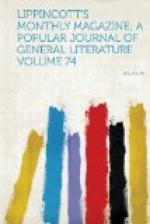The season was not the one for gaining a fair idea of the society of the city and neighborhood; but if all the people who were away at the sea-side and the mountains were half as charming as those left behind and invited by Mr. Porter, to meet his friends, it is certain that Sir Robert lost a great deal. On the other hand, it is equally certain that if they had been at home Sir Robert would most likely be there now, and this chronicle of his travels would end here. As it was, he found something novel and agreeable at every step, a fresh interest every hour of his stay. He began at the beginning, and promptly found out what kind of soil the city was built on, went on to consider such questions as drainage, elevation, water-supply, wharves, quays, bridges, and worked up to libraries, museums, public and private collections of pictures, and what not. He ordered three pictures of Boston artists,—two autumnal scenes, and an interior, a negro cabin, with an hilarious sable group variously employed, called “Christmas in the Quarters.” Then the questions of fisheries, maritime traffic, coast and harbor defences, light-houses, the ship-building interests, life-saving associations, and railway systems, pressed for investigation, to say nothing of the mills and manufactories, wages of operatives, trades-unions, trade problems, and all the pros and cons of free trade versus protective tariff. Over these he pondered and pored until all hours every night; and the diary had now to be girt about with two stout rubber bands to keep it from scattering instructive leaflets about promiscuously and prematurely. And by day there were sites literary, historical, or generally interesting to be visited, engagements with many friends to keep, endless occupations apparently.
There was so much to see and do that the place was delightful to him, and he certainly made himself vastly agreeable in return to such of its inhabitants as came in his way.
“I have added to my circle some very valuable acquaintances, whom I shall hope to retain as friends,” he wrote to England, “notably a medical man who confirms my germ-propagation theory of the ‘vomito,’ which is now raging in the Southern part of the States (I had it, you remember, on the west coast of Africa, and studied it in the Barbadoes),—an exceptionally clever man, and, like all such men, inclined to be eccentric. I think I was never more surprised than to come upon him the other day in a side-street, where he was positively having his boots polished in public by a ragged gamin who offered to ‘shine’ me for a ‘dime.’ He behaved sensibly about it,—betrayed no embarrassment, though he must have felt excessively annoyed, made no apologies, and only remarked that he had been out in the country, and did not wish to be taken for a miller in the town.




